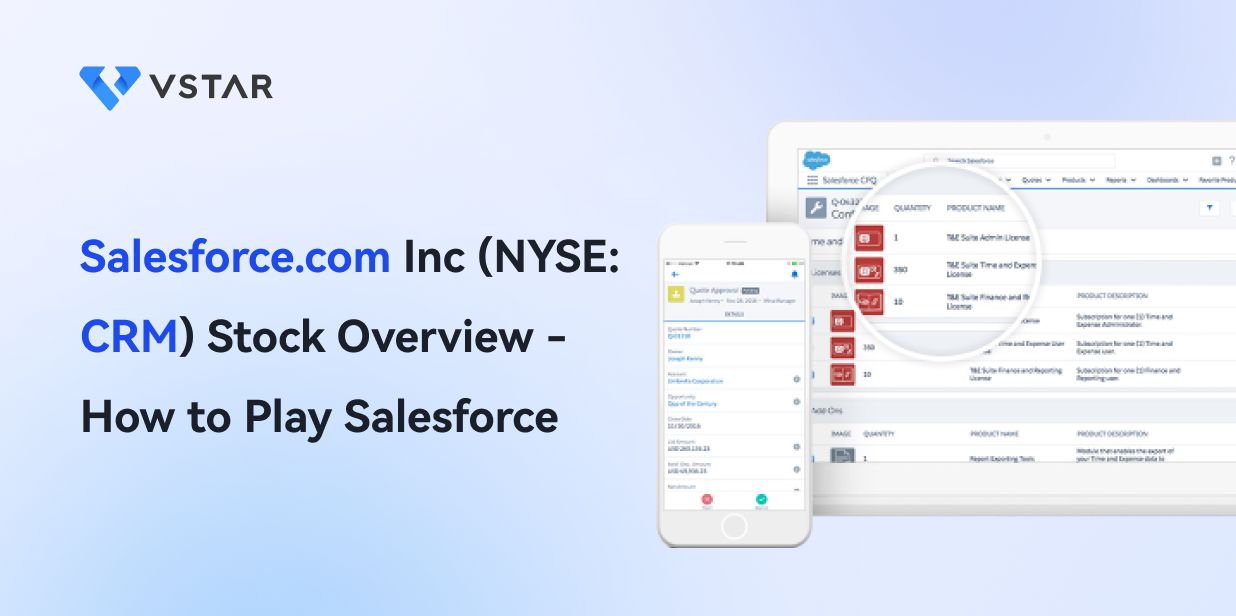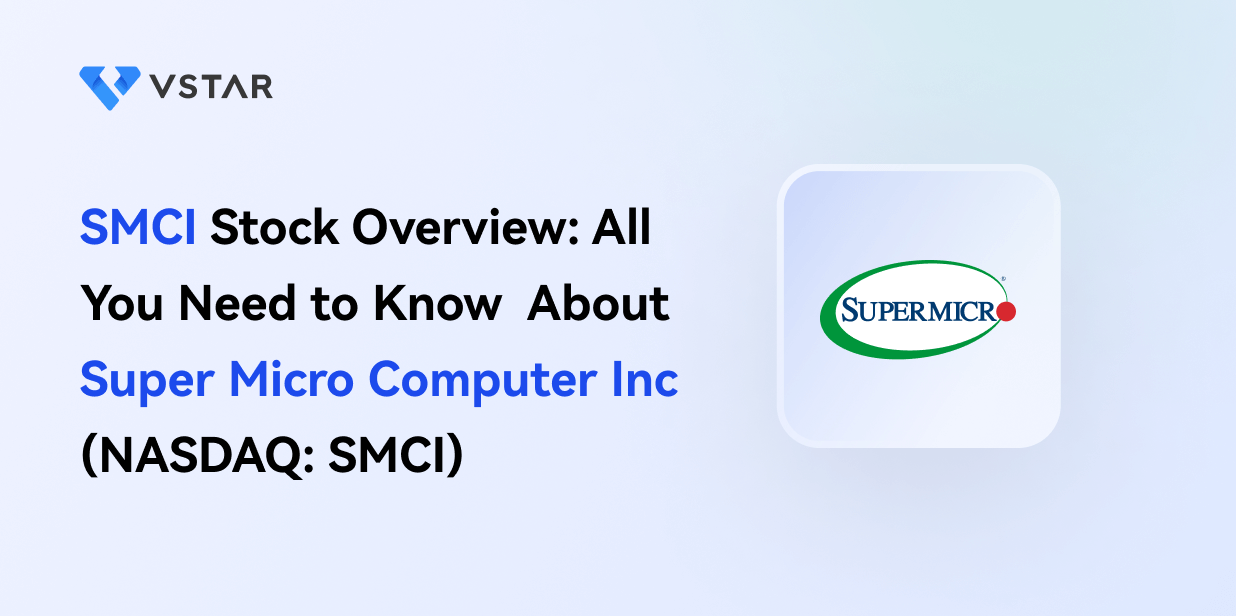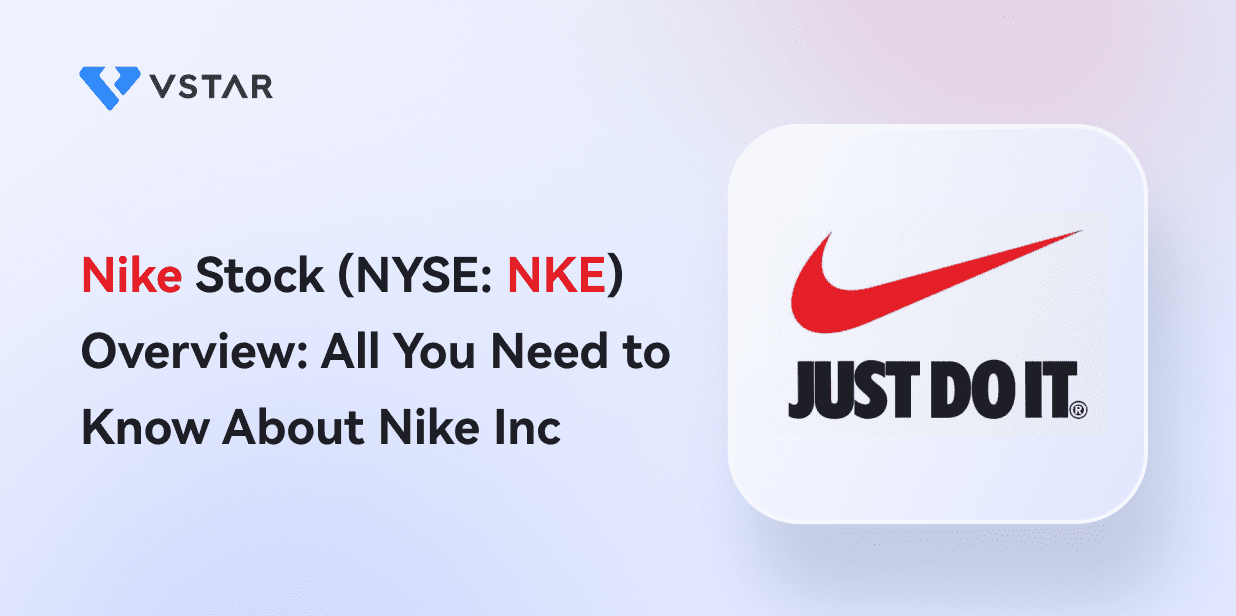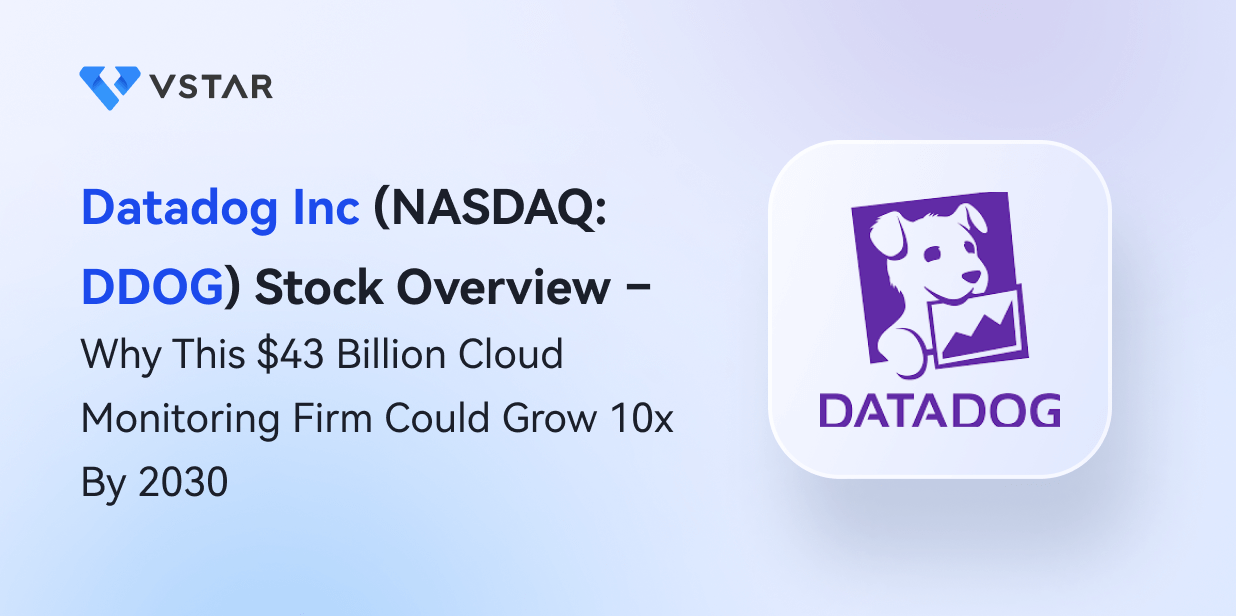Cloud-based customer relationship management (CRM) tools are the “in” thing for businesses nowadays, with many companies opting to use cloud-based CRM services. This is understandable; after all, these CRM solutions do provide several advantages over traditional customer relationship approaches.
This development has, however, led to the emergence of several cloud-based CRM solutions providers like Salesforce. Thanks to the increasing focus on switching to and utilizing CRM solutions, Salesforce has become a major player in the tech landscape, a development that more than reflects in its booming stock price.
Latest Salesforce Stock News Investors Should Note
From our introduction, it’s pretty evident that we believe that Salesforce stock is the current stock to have in your portfolio. However, this conclusion isn’t just based on mere sentiment. There are several news about Salesforce that could potentially have a positive effect on Salesforce stock. Here are some of these news that you should be aware of:

Credit: iStock
● In an exciting announcement, Salesforce (NYSE: CRM) has unveiled its groundbreaking AI Cloud, a game-changing solution designed to revolutionize customer experiences and boost company productivity through generative AI for the enterprise. This product has an innovative Einstein GPT Trust Layer that addresses concerns surrounding the risks associated with adopting generative AI.
● In addition to this, Salesforce has recently announced the release of groundbreaking generative AI product offerings: Marketing GPT and Commerce GPT. With Marketing GPT, marketers can effortlessly generate personalized emails that resonate with their audience on a deeper level. Commerce GPT revolutionalizes the way brands engage with their customers throughout the shopping journey.
● Salesforce also recently announced that it is joining forces with cloud giant, Google Cloud. This strategic partnership is aimed at unlocking the power of data and AI and revolutionizing the way companies engage with their audience across marketing, sales, service, and commerce.
This unique blend of capabilities, security, and strategic partnerships firmly establishes Salesforce as the indisputable leader in AI-powered CRM. It also means that Salesforce now offers tools every company and marker looking to improve revenue will want. The result? A significant bullish movement on the Salesforce stock price!
Salesforce's Overview

Credit: iStock
Salesforce was founded in 1999 by Marc Benioff, Parker Harris, Dave Moellenhoff, and Frank Dominguez. Salesforce's headquarters is located in San Francisco, California. The current CEO of Salesforce is Marc Benioff. Benioff is renowned for his visionary leadership, and he has played a pivotal role in the growth and success of Salesforce.
As a company, Salesforce has come a long way and reached several milestones. Some key milestones include the following:
● Salesforce pioneered the concept of cloud-based CRM, transforming the industry.
● The company went public in 2004 and experienced significant growth in subsequent years
● The introduction of the Salesforce AppExchange, an ecosystem of third-party applications, in 2005.
● The development and release of Salesforce Marketing Cloud in 2012
● Strategic acquisitions, including the purchase of MuleSoft and Tableau, thus expanding its offerings and capabilities.
Salesforce operates in various segments, including Sales Cloud, Service Cloud, Marketing Cloud, and Commerce Cloud, among others. However, in terms of revenue, these segments can be collapsed into just two. They are:
● Subscription and support revenues
● And professional services and other revenues.
Salesforce's Business Model and Services
Salesforce operates on a subscription-based model, where customers pay recurring fees to access its cloud-based CRM software. They provide cloud-based customer relationship management (CRM) software, enabling sales, marketing, and customer service teams to leverage data for business growth. The company generates revenue primarily by selling software licenses, subscriptions, and related services. Additional revenue streams come from professional services, training, and support.
Main Products/Services

Credit: iStock
Salesforce offers a comprehensive suite of cloud-based products and services, including:
Sales Cloud: A CRM platform that helps businesses manage their sales processes, track leads, and optimize sales performance.
Service Cloud: Enables businesses to provide exceptional customer service and support through various channels, including phone, email, social media, and chat.
Marketing Cloud: Offers tools for creating and executing personalized marketing campaigns, managing customer journeys, and analyzing campaign performance.
Commerce Cloud: Provides a unified platform for managing e-commerce operations, enabling businesses to deliver seamless shopping experiences across multiple channels.
Salesforce Platform: A robust platform that allows users to build and customize applications, integrate data, and automate processes.
These products and services empower organizations to enhance customer relationships, streamline operations, drive growth, and make data-driven decisions.
Salesforce's Financials, Growth, and Valuation Metrics

Credit: iStock
As of today, Salesforce boasts an impressive market capitalization of 206.65 billion USD, reflecting its robust position in the market.
In terms of net income, Salesforce's quarter ending April 30, 2023, showcased a remarkable year-over-year increase of 610.71%, with a net income of $0.199B. However, its net income for the twelve months ending April 30, 2023, experienced a decline of 62.21% compared to the previous year, with a net income of $379M.
For the quarter ending April 30, 2023, the company reported a year-over-year increase of 11.28% in revenue, reaching $8.247B. Over the twelve months ending April 30, 2023, Salesforce achieved a 15.2% increase in revenue, totaling $32.188B. Furthermore, Salesforce's stock revenue has experienced substantial growth, soaring from $10,540 million in 2018 to an impressive $31,352 million in 2023, a testament to the company's strong performance.
Looking at Salesforce's financial indicators, the net profit margin as of April 30, 2023, is 1.18%. Additionally, the stock's P/E ratio (TTM) as of June 2023 is 758, indicating a premium valuation in the market. In terms of revenue growth, Salesforce outshines its closest competitors. With revenue earnings of $32.19B, it surpasses Adobe ($18.43B) and Intuit Inc. ($14.07B), solidifying its position as an industry leader.
Based on the assessment of 2 Stage Free Cash Flow to Equity, Salesforce's estimated fair value is US$279. Considering its current share price of US$199, this suggests that the stock may be undervalued by approximately 29%.
CRM Stock Performance

Credit: iStock
Salesforce.com Inc (CRM) is listed on the New York Stock Exchange (NYSE) under the ticker "CRM.” The company is based in the United States, so Salesforce stock is traded in US dollars. CRM stock is traded during regular trading hours on the NYSE, which are typically from 9:30 AM to 4:00 PM Eastern Time, Monday to Friday.
In addition to regular trading hours, there may be pre-market and after-market trading sessions. During pre-market hours, trading can occur before the official market opening, and after-market trading occurs after the market closes. The availability and duration of pre-market and after-market trading sessions can vary.
Stock Splits: Salesforce stock has only undergone one stock split, a 4-1 CRM stock split on April 18th, 2013.
Dividends: As of June 26, 2023, the trailing twelve months (TTM) dividend payout for Salesforce stands at $0.00.
Overview of CRM Stock Performance
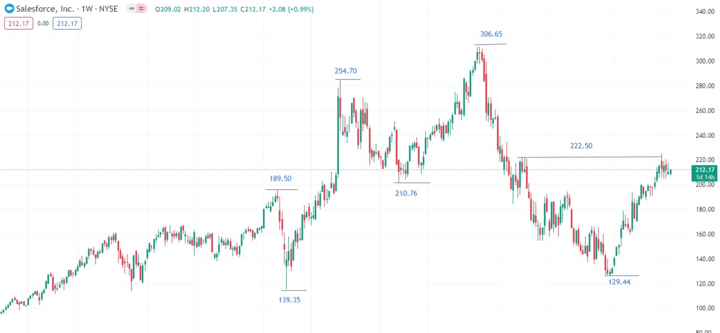
Credit: TradingView
Since its launch and listing, CRM stock has enjoyed amazing progress, growing in value from under $5 to around the $189.50 price level. At this point, however, CRM stock price briefly dipped to the 139.35 price level before resuming its bullish movement in a run that saw it smash the old high and set a new one around the 254.70 price level.
Again at this point, Salesforce stock dipped in price briefly to 210.76 before resuming its bull run and setting another all-time high of 306.65. After this, CRM stock price massively dropped to the 129.44 price level. Since then, however, CRM stock has been steadily making its way up again, recently testing an old supply price zone of 222.50.
If the price breaks above this level, the next Salesforce stock price target may be the all-time high of 306.65. Currently, CRM stock price is hovering around the 212.17 price level.
Key Drivers of CRM Stock Price
There are several things that could serve as key drivers for CRM stock price. Some of these include the following:
Revenue Growth: One of the primary drivers of CRM stock price is revenue growth. As Salesforce continues to expand its customer base and generate higher sales, investors perceive it as a positive indicator of the company's financial health and prospects.
Profitability and Margins: Another critical factor influencing CRM stock price is profitability. Investors closely monitor the company's profitability metrics, such as gross profit margin, operating margin, and net profit margin.
Market Expansion and Penetration: Salesforce's ability to expand into new markets and penetrate existing markets is a key driver of CRM stock price.
For example, Salesforce’s recent announcement of its strategic partnership with Google Cloud is a development that opens new growth opportunities or expands its customer base. Thus generating optimism among investors and leading to a potential increase in Salesforce stock price. Also, If Salesforce reports strong revenue growth in a particular quarter, exceeding market expectations, it can lead to a positive reaction from investors, potentially driving up CRM stock price.
Future Prospects of CRM Stock
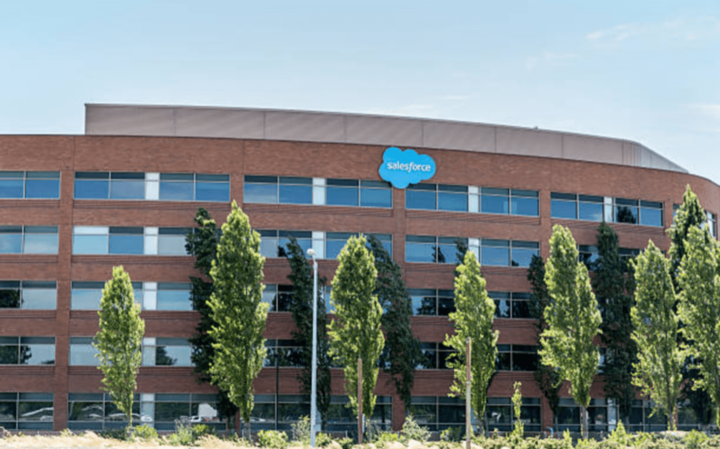
Credit: iStock
The future prospects of CRM stock are influenced by various factors that indicate the potential for long-term growth and sustained performance. Some of these include the following:
Innovation and Product Development: Salesforce's ability to innovate and develop new products and features is crucial for staying competitive in the dynamic technology market.
For example, if Salesforce launches a groundbreaking product or introduces innovative features that resonate with customers and gain significant market adoption, it can bolster the company's prospects and positively impact CRM stock price.
Competitive Landscape: Salesforce operates in a competitive environment, and its ability to maintain or enhance its market position relative to competitors is vital. If Salesforce successfully fends off competition, secures strategic partnerships (like its Google Cloud partnership), or showcases a unique value proposition that differentiates it from rivals, it can position itself for future success, potentially influencing the stock price positively.
Market Demand and Industry Trends: The overall demand for customer relationship management (CRM) solutions and the broader trends within the technology industry can influence CRM stock's prospects.
For example, if industry reports project strong market growth for CRM software and highlights Salesforce as a leader in the space, it can create a positive outlook for the company's future performance and drive investor confidence.
CRM Stock Forecast: According to the forecasts provided by 41 analysts for the next 12 months, the median target for CRM stock stands at 242.00. This represents a potential increase of +14.05% from the last recorded price of 212.19.
Salesforce Challenges and Opportunities

Credit: iStock
Salesforce faces competition from various players in the application software industry. Notable competitors include companies like Palantir Technologies (PLTR), Adobe Inc. (ADBE), Marathon Digital Holdings (MARA), and Zoom Video Communications (ZM), among others. These competitors vie for market share and potentially challenge Salesforce's growth.
A new product release by Adobe Inc. (ADBE) addressing customer pain points not addressed by Salesforce's currently available product releases could result in an efflux of customers, thus causing a drop in CRM stock prices.
Other Risks:
Aside from competition, Salesforce also faces other risks and challenges that can impact its business. These risks include:
Integration and Execution: As Salesforce expands its product portfolio and pursues acquisitions, successful integration and execution become critical. Challenges may arise in integrating new technologies, systems, and teams effectively.
Data Security and Privacy: In the era of increasing data breaches and regulatory scrutiny, protecting customer data and ensuring compliance with privacy regulations is paramount. Any security breaches or data mishandling incidents can damage Salesforce's reputation and result in legal and financial consequences.
Growth Opportunities
Despite the risks and challenges, Salesforce also enjoys significant growth opportunities:
Strong Brand and Customer Loyalty: Salesforce has established itself as a leading provider of CRM solutions, earning a strong brand reputation. The company's focus on customer success, innovative products, and excellent customer service fosters loyalty and retention, creating opportunities for cross-selling and upselling.
Digital Transformation: The ongoing digital transformation across industries presents immense growth potential for Salesforce. As businesses increasingly prioritize customer-centric strategies and leverage technology, the demand for CRM solutions is expected to rise, offering opportunities for Salesforce to expand its market share.
Future Outlook and Expansion
Salesforce's commitment to innovation and product development positions it to capitalize on emerging technologies and industry trends. By continuously enhancing its product offerings and staying ahead of market demands, Salesforce can solidify its position as a leader in the CRM space. For example, Salesforce might form strategic partnerships with other tech companies to enhance its offerings. For instance, a partnership with a leading analytics firm could improve the data analysis capabilities of Salesforce products, thereby providing more value to customers. Also, Salesforce can further integrate AI capabilities into its suite of products. This would allow users to leverage data more efficiently and effectively, offering a competitive edge in the CRM space.
Trading Strategies for CRM Stock
Technical analysis tends to be the favored approach of investors for trading CRM stock. This is because technical analysis provides a broad overview of market history and allows for easy analysis. Want to trade CRM stock? Here are three technical analysis trading strategies you should consider when trading CRM stock:
Moving Average Crossover: The moving average crossover strategy involves using two or more moving averages to identify potential buy or sell signals. Traders typically use a shorter-term moving average (e.g., 50-day) and a longer-term moving average (e.g., 200-day). When the shorter-term moving average crosses above the longer-term moving average, it may signal a bullish trend and generate a buy signal and vice versa. In the chart below, we see that whenever the 50-day MA crossed below the 200-day MA, it signaled a bearish market movement. Conversely, when it crossed above the 200-day MA, it signaled a bullish movement.
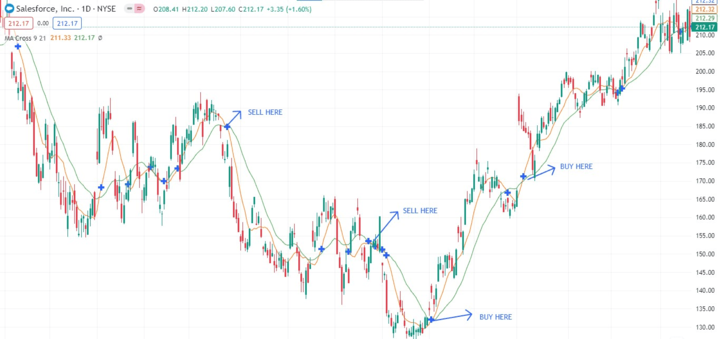
Relative Strength Index (RSI) Divergence: Traders can use RSI divergence to identify potential trend reversals or shifts in momentum. If the CRM stock price is making higher highs while the RSI is making lower highs (bearish divergence), it may suggest a potential trend reversal to the downside and generate a sell signal and vice versa. A look at the chart below showed that when the RSI value dipped below the 30-mark, it triggered a market reversal into a bullish movement. On the other hand, when price became overbought, that is, traded above the 70-mark, it triggered a bearish movement.
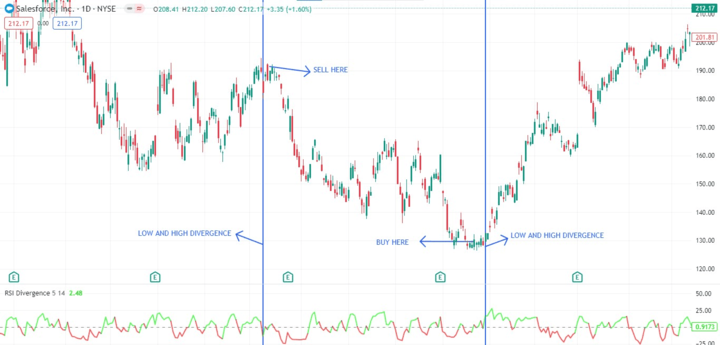
Breakout Trading: Breakout trading involves identifying key support and resistance levels on the CRM stock chart and entering trades when the price breaks out above resistance or below support with high trading volume. Traders may use technical indicators such as Bollinger Bands, which measure volatility, to identify potential breakout opportunities. For example in the chart below, we see that when the CRM stock price breaks above the upper Bollinger Band, it signals a bearish breakout, prompting a sell signal. Conversely, when it breaks below the lower band, it triggers a bullish breakout, prompting a buy signal.
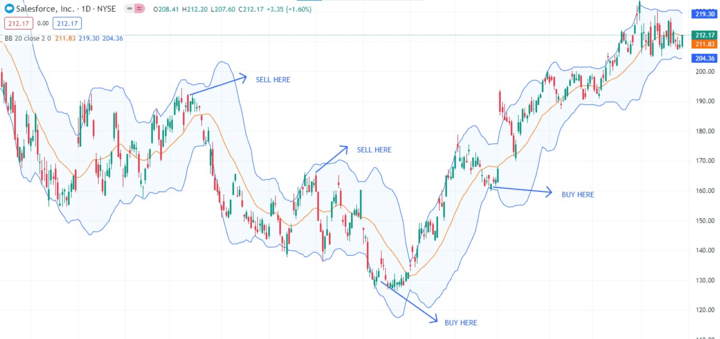
There are several options for trading and profiting from CRM stock. However, if you want to make consistent profits, then trading CFDs of CRM stock is the way to go!
Advantages of CFD
Some major advantages of CFDs include the following:
Liquidity: CRM stock CFD markets generally have high liquidity, meaning there are usually buyers and sellers available. So you’ll be able to enter and exit positions quickly and at competitive prices.
Flexibility: CFDs offer flexibility in terms of trading strategies. Traders can enter both long (buy) and short (sell) positions and use various order types (e.g., stop-loss and take-profit orders). You can also employ different risk management techniques to suit your trading preferences.
Leverage: With CFDs, you can access larger positions with a smaller initial capital outlay. This leverage can amplify your potential profits. However, it's important to note that leverage also increases the risk of potential losses.
Diversification: CFDs offer a wide range of underlying assets, including stocks, indices, commodities, and currencies. So you can diversify your investment portfolios and potentially benefit from different market conditions.
Trade CRM Stock CFD at VSTAR
Interested in trading CRM stock CFDs but don’t know where to start? Download VSTAR and get access to amazing CFD trading perks! VSTAR is a CFD trading platform that offers CFDs on Forex, Stock, Indices, Gold, Oil, Crypto, and 1000 other popular instruments.
Advantages of VSTAR
Up to 1:200 Leverage Available: VSTAR offers high leverage of up to 1:200, allowing you to control larger CRM stock trading positions with a smaller initial investment.
Filled at the Best Market Prices and Executed within Milliseconds: VSTAR CRM stock CFD trades are executed at the best available market prices, thus providing you with competitive and efficient order execution.
Beginner-Friendly Design: The VSTAR app is a user-friendly platform designed to cater to beginners in trading. The platform offers intuitive navigation, easy-to-understand features, and educational resources to support new traders in understanding and navigating the CRM stock market effectively.
Ultra-Low Trading Cost: VSTAR also provides traders with ultra-low trading costs to help maximize potential profits.
Conclusion
As more and more businesses switch to cloud-based CRM services, you can expect to see a corresponding increase in stock prices of CRM providers like Salesforce. Financial analysis and expert projections also agree that CRM stock is due for a bullish price movement. So download VSTAR today and position yourself to fully take advantage!
